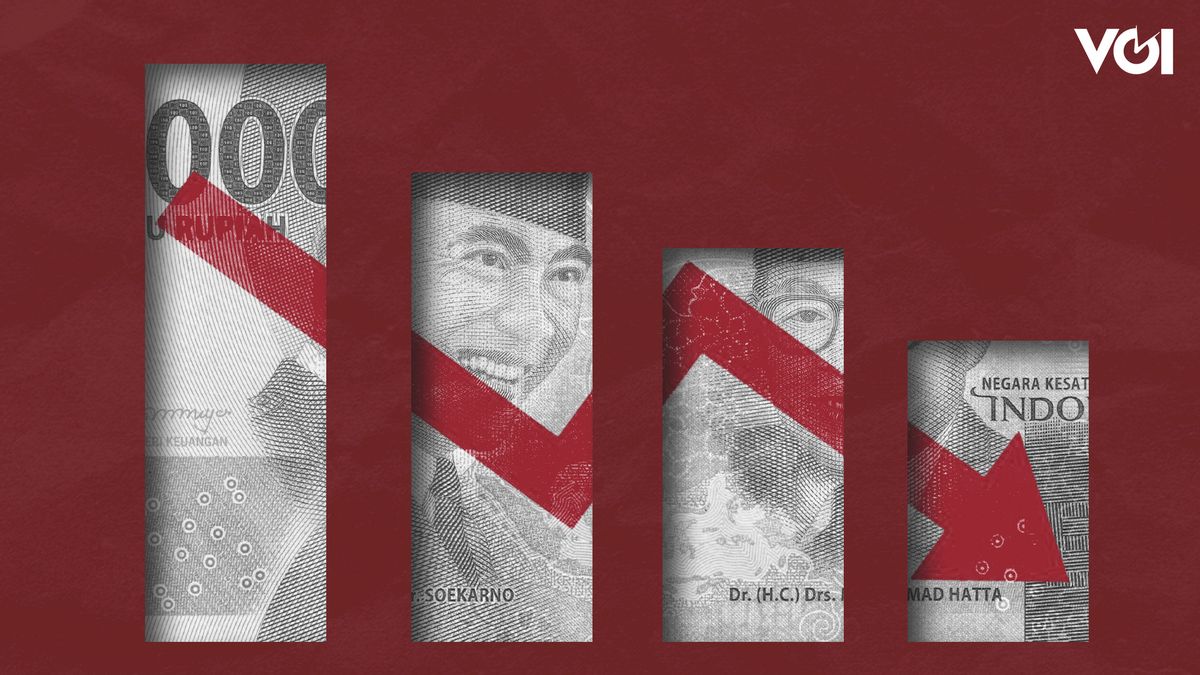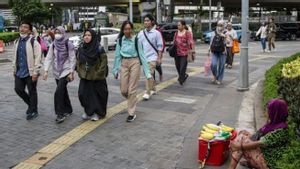Towards the end of the Joko Widodo (Jokowi) administration, the number of middle classes in Indonesia was declared to be decreasing.
In the last five years, the growth of the middle class, which had created optimism in the post-reform era, has now faced serious challenges. According to BPS, the number of middle class households has continued to shrink, especially since the COVID-19 pandemic hit.
BPS data shows that more than 20% of households that were previously considered middle class are now in the vulnerable category, with income approaching the poverty line. According to the Acting Head of BPS, Amalia Adininggar Widyasanti, Indonesia's middle class proportion in 2024 has 47.85 million people lower than in 2019, which was 57.33 million people.
SEE ALSO:
The Indonesian Forum for Budget Transparency (Fitra) stated Jokowi's promise to bring economic growth of 7 percent has never been achieved. In his last 10 years, his government was stagnant and inequality became increasingly gaping. As long as his government only reached 5.02 percent growth
"If measured based on Gross Domestic Product (GDP) at current prices, national economic growth reaches IDR 11,540.8 trillion and GDP per capita reaches IDR 45.2 million or 3,377.1 US dollars," wrote Misbah Hasan, Secretary General of Fitra, through his official website.
During the pandemic there was a fairly deep contraction in 2020. That was up to minus 2.07 percent. In 2021 it rose to 3.7 percent and returned to a 5 percent trend in 2022," he added
The downward trend in the middle class is quite worrying, considering that the middle class is usually considered to support economic growth and social stability in a country. This decline shows that there are major challenges in maintaining sustainable economic welfare.
Many people suspect that the cause of this middle class decline is the economic impact of the COVID-19 pandemic. The COVID-19 pandemic, which lasted almost 2 years, has had a major impact on the Indonesian economy. Senior economist and former Minister of Finance, Bambang Brodjonegoro, revealed that due to the pandemic, many middle class in Indonesia have fallen poor.
Many sectors, especially small and medium industries, experienced a sharp decline in revenue. Medium people who work in the informal sector or as small entrepreneurs are the hardest affected. Business closures, labor reductions, and work hours reductions have caused many middle class families to lose their main source of income.
After the pandemic, inflation has increased sharply in many countries, including Indonesia. Prices of basic necessities such as food, transportation, and energy have soared, which directly reduces the purchasing power of the middle class. Although the minimum wage had increased in several regions, this increase was not comparable to the inflation rate, so many middle class families faced greater economic pressures.
"After the pandemic subsided, people were hit by other problems such as high interest rates. The increase in interest rates inevitably affected the economy." Bambang said as quoted by CNBC, last July.
Another impact, the unemployment rate, especially among young people and informal sector workers, continues to increase. Many jobs were lost during the pandemic and did not return quickly. Uncertainties in the labor sector made many people experience a decline in income. In addition, the increase in contract and freelance work without social security adds to the instability for the middle class, which used to be more stable.
One of the factors that has also worsened the condition of the middle class is the higher debt burden. Many middle class families who previously relied on credit to buy houses, cars, or other necessities are now facing difficulties in paying installments. With declining income and high inflation, these debts become a heavy burden that drives them closer to the poverty line.
Middle class often relies on private education and health services, which are increasing in costs. The increasing cost of education and the limited access to affordable health worsen the condition of middle-class families. Many of them have to cut their budget for this important service, which ultimately threatens their social mobility.
Motorcycles And Pillars Of Economic Growth
A significant middle class decline has an impact on Indonesia's economy and social stability. The middle class serves as a driving force for domestic consumption, which is an important pillar in the country's economic growth. If their numbers continue to decrease, people's purchasing power will decrease and economic growth could slow down. In addition, the decline in the middle class can lead to greater social tensions, as more people feel economically insecure.
Member of Commission XI DPR RI from the PKS faction Anis Byarwati asked the government to help the middle class. Because with the growth of this middle class it has the potential to encourage increased consumption and in turn the national economic growth, on the other hand if it decreases, it will erode economic growth," he said as quoted on the PKS website, early last September. He also asked the government not to issue counterproductive policy policies.
"The government should encourage social policies that expand the middle class, such as through larger spending on education and health," he said.
The government has issued several policies to address this problem, including social assistance, economic stimulus, and the national economic recovery program (PEN). Although these steps help maintain short-term economic stability, there needs to be long-term strategies that focus on strengthening more inclusive economic sectors, investing in education and health, as well as better social protection for workers in the informal sector.
The decline in the number of middle class in Indonesia that leads to a vulnerability is a warning sign for the sustainability of the national economy. The combination of the pandemic, inflation, unemployment, and debt burdens exacerbated this situation, and if not taken seriously, it could cause major losses to the economy and society. Therefore, the government and related parties must focus on long-term solutions that can restore stability and middle class growth as the main pillars of the country's economy.
The English, Chinese, Japanese, Arabic, and French versions are automatically generated by the AI. So there may still be inaccuracies in translating, please always see Indonesian as our main language. (system supported by DigitalSiber.id)

















